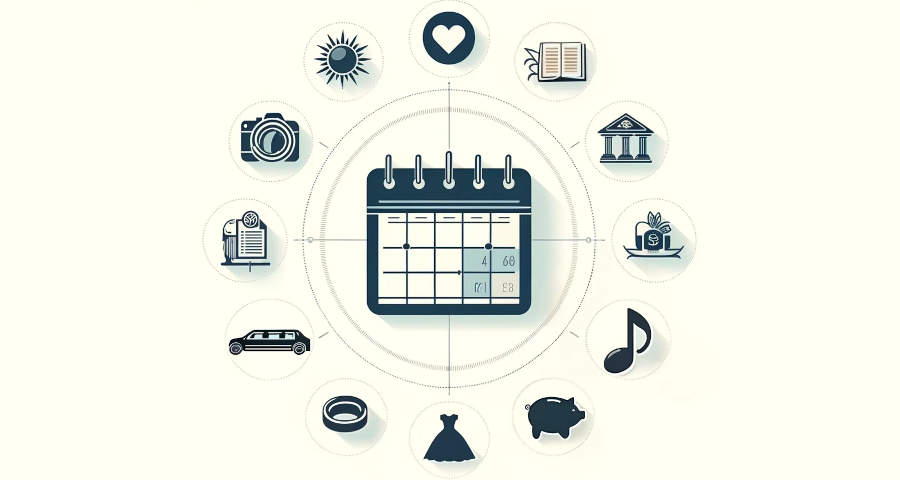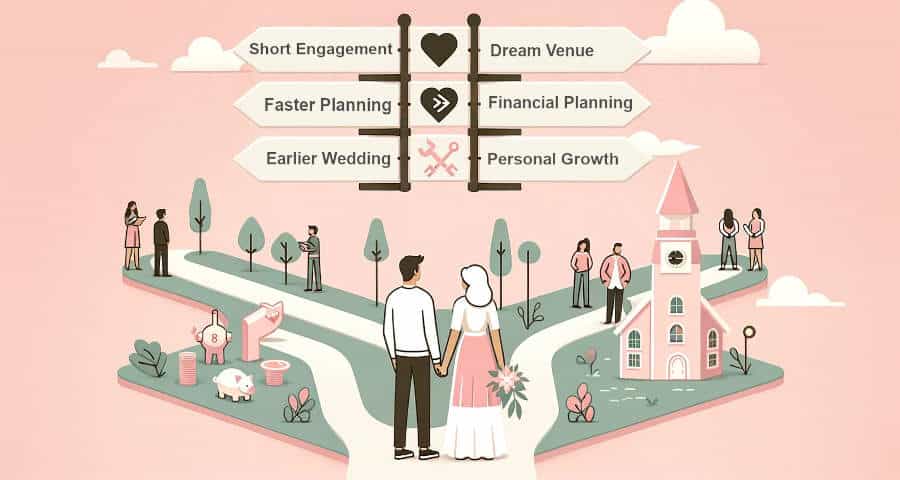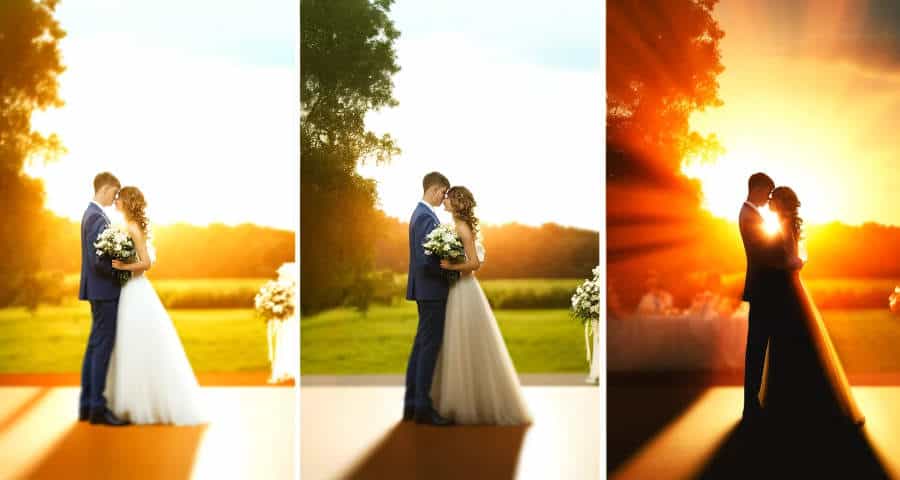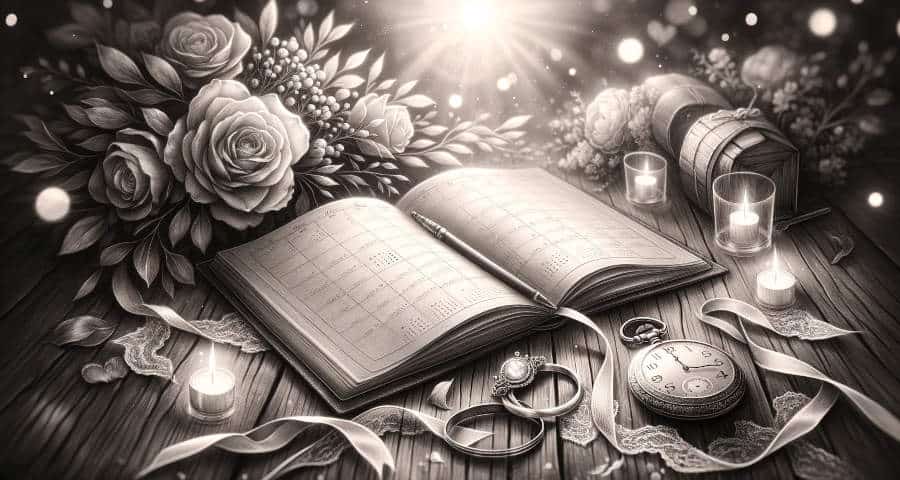Timing, as they say, is everything.
The date you choose impacts numerous aspects of your wedding, from the guest list to the venue availability, and even the overall atmosphere of the day.
For instance, a summer weekend might offer perfect weather for an outdoor event but could also mean higher demand for venues and services. On the other hand, a winter date might be less sought after, potentially lowering costs and giving you more flexibility with vendor choices.
Choosing the right date is about balancing these factors to create the perfect setting for your special day.
What makes an Optimal Wedding Date?

An optimal wedding date is one that best aligns with a variety of factors to meet your personal preferences, logistical needs, and budget considerations.
- Weather: Choosing a date when the weather is likely to be favorable is crucial, especially for outdoor events. This means considering typical weather patterns for your chosen location and time of year. For example, a fall wedding might avoid the heat of summer and the unpredictability of spring weather.
- Guest Convenience: An optimal date should also consider the convenience of your guests. This includes selecting a date that does not clash with major holidays or events, which might affect travel and accommodation availability and costs. A weekend date might be more convenient for guests who would need to take time off work to attend.
- Venue and Vendor Availability: The best wedding dates are those on which your preferred venue and key vendors (like photographers, caterers, and bands) are available. Popular venues and vendors can book up far in advance, especially on weekends or during peak wedding seasons.
- Cost: Costs can vary significantly based on the date selected. Off-peak seasons or days of the week (like weekdays) often result in lower prices for venues and vendors due to decreased demand.
- Personal Significance: Many couples consider dates with personal significance, such as the anniversary of their first meeting, their engagement, or a special family date. This adds a memorable and meaningful element to the occasion.
- Cultural or Religious Considerations: For some couples, certain dates have cultural or religious significance that make them more desirable for hosting their wedding.
- Legal and Administrative Considerations: It’s also practical to consider any legal or administrative issues related to your wedding date, such as obtaining marriage licenses within certain time frames or ensuring all documentation is ready for a destination wedding.
Choosing the Right Length for Your Engagement

The period between a couple’s engagement and their wedding day, known as the engagement length, varies widely from just a few months to several years.
This time frame is not just a countdown, it’s a crucial phase that shapes the entire wedding planning process and can greatly influence the eventual success of the event.
When deciding on the length of your engagement, it’s important to weigh your priorities and consider how this timeframe will impact your planning, financial goals, and personal preparations for the big day.
Reasons for Longer Engagements
Many couples opt for a longer engagement for several reasons:
- Financial Planning: More time to save means potentially more lavish celebrations or choices, especially during the high season when prices and demand peak.
- Vendor and Venue Availability: Early planning increases the likelihood of securing your preferred date at a dream venue or booking top-tier vendors who often require advance booking.
- Guest Considerations: Extending the engagement allows guests, especially those traveling from afar, ample time to arrange travel and accommodations, ensuring better attendance.
- Personal Preparation: A longer timeline gives you more room for personal growth and preparation, such as undergoing premarital counseling, planning an elaborate honeymoon, or reaching personal health and fitness goals.
Reasons for Shorter Engagements
Conversely, some couples may choose a shorter engagement due to:
- Venue Availability: Sometimes the perfect venue has limited availability, prompting couples to speed up their timeline.
- Personal Circumstances: Life circumstances such as career moves, family considerations, or other personal reasons may necessitate a quicker wedding.
- Desire to Marry Sooner: Simply put, some couples prefer to expedite their wedding due to their eagerness to start their married lives.
Balancing Seasonal Preferences
The choice of season can also dictate the length of the engagement. If you have a specific vision for your wedding, such as an autumnal setting with specific foliage or a summer beach wedding, planning your engagement length to suit these seasonal preferences is crucial. This ensures that your wedding aesthetics align with your dream vision.
Ultimately, determining the right engagement length involves a delicate balance between your personal desires, logistical necessities, and the overall vision for your wedding. It’s about making informed choices that will set the foundation for a memorable and joyous celebration, reflecting both your love story and practical considerations.
Choosing the Best Season for Your Wedding

Each season offers unique advantages for a wedding. Consider what season aligns best with your vision and practical considerations like weather, venue availability, and guest comfort to choose the perfect time of year for your special day.
Spring: Fresh Beginnings
Spring weddings are popular due to the pleasant weather and natural beauty as flowers bloom and landscapes turn green.
- Ideal Settings: Gardens, vineyards, and estates.
- Pros: Mild weather and natural floral decorations.
- Cons: Potential for rain; allergies might be a concern for some guests.
- Wedding Tip: Use seasonal flowers like daffodils and lilacs to enhance your venue’s aesthetics.
Summer: Vibrant and Lively
Summer is perfect for couples wanting an outdoor wedding with a lively atmosphere, thanks to the longer days and warm nights.
- Ideal Settings: Beaches, parks, and rooftops.
- Pros: Good weather and great for destination weddings.
- Cons: Heat can be intense, and popular venues book up quickly.
- Wedding Tip: Provide shade, hydration stations, and consider a lighter menu.
Fall: Cozy and Colourful
The cooler temperatures and stunning fall foliage provide a beautiful setting for weddings, making it a favoured choice for many.
- Ideal Settings: Barns, wineries, and orchards.
- Pros: Beautiful backdrops and comfortable weather.
- Cons: Days get shorter, and nights can be chilly.
- Wedding Tip: Decorate with seasonal elements like leaves and branches for a rustic look.
Winter: Intimate and Elegant
Winter weddings can offer a magical and intimate setting, especially for indoor celebrations that can be made cozy with the right decor.
- Ideal Settings: Ballrooms, lodges, and indoor halls.
- Pros: Less competition for venues and vendors, potentially lower costs.
- Cons: Weather can affect travel plans; more heating is necessary.
- Wedding Tip: Use warm lights and rich colours to create a cosy ambiance, and serve warm drinks.
Be Mindful of Major Holidays and Events

Being aware of major holidays and local events is essential when planning your wedding date.
It not only ensures a smoother and more enjoyable experience for you and your guests but also helps in managing your budget more effectively. By considering these factors, you can avoid potential pitfalls and enjoy a celebration that’s both memorable and stress-free.
Major Holidays to Consider
- New Year’s Eve and New Year’s Day: These are popular for festive weddings but can be expensive and competitive in terms of venues and vendors.
- Valentine’s Day: Especially romantic for weddings, but often comes with higher costs for flowers and venues.
- Easter Weekend: Can affect availability of guests who may have family obligations or travel plans.
- Memorial Day, Independence Day, and Labor Day: These long weekends are ideal for weddings that require travel, but book early as venues and accommodations fill up fast.
- Thanksgiving Weekend: Offers a long weekend that’s perfect for family to gather, but travel and lodging can be significantly more expensive.
- Christmas and the surrounding days: A magical time for a wedding, though it can be challenging for guests due to family commitments and high travel costs.
Local Events to Watch Out For
- Sports Events: Large events like marathons or championship games can disrupt local traffic and limit hotel availability.
- Festivals: Music, food, or cultural festivals can attract large crowds and complicate logistics for your guests.
- Conferences and Conventions: These can lead to booked-up venues and inflated prices for accommodations.
- Research Local Event Calendars: Regularly check with your local tourism board or city event calendar to identify any potential conflicts that could impact venue availability, accommodation prices, or general logistics on your chosen date.
Tips for Choosing an Ideal Date
- Research Local Event Calendars: Check with your local tourism board or city event calendar to avoid unexpected surprises.
- Consider Shoulder Seasons: The periods right before or after major holidays or local events can offer the festive atmosphere or seasonal beauty you desire, often with fewer drawbacks.
- Communicate with Vendors Early: Ask your potential vendors about any local events or holidays that could impact your wedding date.
- Alternative Date Suggestions: If your heart is set on a particular venue or season, consider a weekday wedding to avoid the competition and high costs associated with weekends around major events.
Venue Availability

The availability of your wedding venue can significantly dictate the timing of your wedding.
By understanding the dynamics of venue booking and incorporating flexibility and early planning into your approach, you can greatly increase your chances of securing both your dream venue and your preferred wedding date.
This strategic approach not only helps in managing your expectations but also ensures that your wedding planning process is as smooth and stress-free as possible.
Why Venue Availability Can Be So Influential
- High Demand: Popular venues are in high demand and can be booked years in advance, particularly on weekends or during peak wedding seasons like spring and fall.
- Exclusive Vendors: Some venues require the use of their in-house services or approved vendors. If these services are booked, this too can affect your date choices.
- Atmosphere and Capacity: Specific features of a venue such as ambiance, size, and layout are often non-negotiable for couples, making the availability of such venues even more critical.
Start Early
The earlier you start your search for venues and vendors, the better. Popular venues and highly-rated vendors can be booked out up to a year or more in advance, especially during peak wedding seasons.
- Timing Tip: Aim to book your major vendors and venue at least 9-12 months in advance. For very popular options, consider starting your search and bookings 18 months before your wedding.
How to Navigate Venue Availability
Given the importance of venue availability, here are some strategies to ensure you get the venue you want without compromising on your wedding date:
- Flexibility: Being flexible with your date can open up more options. Consider less popular days of the week or seasons. For example, a Friday or a winter wedding might not only be easier to book but also less expensive.
- Early Planning: Start your venue search as soon as possible. The earlier you begin, the better your chances of securing your desired venue on a date that works for you.
- Backup Options: Have a list of second-choice venues in case your top choice isn’t available. Sometimes second choices turn out to be just as perfect once you see them in person.
Securing Your Preferred Date
Once you find a venue with the availability you need, secure it immediately:
- Deposit: Be prepared to pay a deposit to hold your date. This is standard practice to ensure that the venue holds the date exclusively for you.
- Contract Review: Thoroughly review the contract with your venue. Understand all the terms, particularly those related to cancellations or changes in date, to avoid any surprises.
Personal Factors Influencing Your Wedding Date

There are personal considerations that extend beyond the season and venue availability. These factors ensure the chosen date aligns not only with logistical needs but also with personal life events and preferences, contributing to the overall joy and stress-free nature of your special day.
- Health Considerations: Account for any health conditions that you or key attendees have that could be affected by seasonal changes, ensuring everyone can enjoy the day comfortably.
- Budget Planning: Your current financial situation and upcoming milestones can significantly impact when you can realistically afford the wedding you desire.
- Significant Family Events: Align your wedding date with important family events to avoid conflicts and ensure maximum attendance.
- Relocation Plans: Consider any planned relocations for yourself or close family members which might necessitate scheduling your wedding at a more convenient time.
- Work Commitments: Professional responsibilities, such as crucial project phases or job transitions, should be considered to minimise stress and ensure availability.
- Academic Commitments: If you or any of your key guests are involved in educational programs, consider the academic calendar, especially exam periods or heavy assignment schedules. Planning your wedding during school holidays or between semesters might ease participation for students and academic professionals.
- Travel Requirements: For international guests or couples, consider the lead times for visa applications and other travel-related necessities.
- Honeymoon Plans: Consider how your chosen wedding date aligns with the best travel times for your honeymoon destination. For instance, if you’re planning a beach honeymoon, ensure it’s not during the rainy season at your destination. Similarly, if you’re aiming for a ski honeymoon, you’ll want to choose a date that coincides with the winter months in your desired location.
Consult with Key Family Members and Friends

Choosing your wedding date is a deeply personal decision that primarily revolves around you and your partner’s preferences.
While it’s important to consider the availability of key family members and friends to ensure they can celebrate this special day with you, remember that the final decision should align with what’s best for both of you.
Prioritising Your Preferences
Your wedding day is a celebration of your relationship and future together. Therefore, your preferences are paramount when selecting a date. Here’s how to keep your priorities at the forefront:
- Start with Your Vision: Discuss with your partner what your ideal wedding looks like, including the season, location, and size, which will guide your date selection.
- Set Boundaries: Be clear about how much external input you are willing to consider. This will help manage expectations and keep you and your partner as the decision-makers.
Consulting Key Individuals
While consulting key family members and friends can be beneficial, the ultimate choice of your wedding date should reflect what’s best for you and your partner. This day marks the beginning of your life together and should align with your dreams and plans. Balancing input with your priorities ensures that your wedding day remains a true celebration of your love and shared future.
Involving loved ones in the planning process can enrich the experience and ensure that those closest to you feel included.
- Selective Consultation: Choose whom to consult based on the closeness of the relationship and the logistical impact of their attendance, like long-distance family members.
- Communicate Clearly: When reaching out for input on dates, communicate that while their availability is important, the final decision will be made based on what’s best for you and your partner.
Handling Conflicts with Grace
Not everyone’s schedules will align, and some key individuals may not be available on your preferred date. Here’s how to handle these situations gracefully:
- Express Gratitude for Input: Acknowledge and thank your loved ones for their input, even if you decide on a date that doesn’t work for everyone.
- Offer Alternatives: If someone important can’t attend, find alternative ways to involve them, such as a special gathering before or after the wedding or including them via a video call during the ceremony.
- Stay United: Ensure that you and your partner present a united front when communicating decisions that might disappoint someone.
Considering External Factors: Astrology, Auspicious Dates, and Feng Shui

Choosing a wedding date involves more than picking a day that looks good on a calendar. Having a date that holds special meaning can make your wedding feel uniquely yours, adding an extra layer of personal significance to the celebration.
For many, it includes aligning with cosmic forces through astrology, adhering to cultural beliefs about auspicious dates, and ensuring the environment is energetically balanced through Feng Shui.
These external factors are believed to contribute not only to the success of the wedding day but also to the long-term happiness of the couple’s union.
Astrology
Astrology can play a key role in determining wedding dates, especially in cultures that value celestial alignments:
- Western Astrology: Couples might choose a date when the sun, moon, and planets align favourably, enhancing harmony and balance in their marriage. For instance, Venus, the planet of love, in a favourable position can be considered auspicious for love and marriage.
- Vedic Astrology: In Indian culture, an astrologer selects a ‘muhurat’ or auspicious time based on the lunar calendar and the couple’s astrological charts. This ensures that the stars support the couple for long-lasting happiness and prosperity.
Auspicious Dates
Many cultures believe in choosing wedding dates that are deemed auspicious:
- Chinese Lucky Dates: The Chinese calendar includes dates considered especially lucky for weddings. These are chosen based on the lunar cycle and the Zodiac signs of the couple, aiming to ensure luck and good fortune.
- Jewish Tradition: Certain days of the Jewish calendar are preferred for weddings due to historical and religious significance. For example, some days are avoided, like the Sabbath or days of mourning, whereas others, like Tuesday, are considered particularly favourable.
Feng Shui
Feng Shui, the ancient Chinese art of arrangement to promote harmony, also influences the choice of a wedding date:
- Kua Numbers: In Feng Shui, Kua numbers, which are determined based on a person’s birth year, can guide the selection of an auspicious wedding date. Dates are chosen to align positively with the couple’s Kua numbers to foster a balanced and joyful marriage.
- Directional Feng Shui: The direction in which certain wedding rituals are performed, and even the seating arrangement at the wedding, can be influenced by Feng Shui principles. Selecting a date that aligns with favourable directions can enhance positive energy flow.
The Optimal Time of Day for Your Wedding Events

The timing of different parts of your wedding day, from the ceremony to the reception, plays a crucial role in the day’s flow and overall success.
The Ceremony
- Morning: A morning wedding, typically starting around 10 AM, offers soft, natural light and cooler temperatures, ideal for outdoor settings. This light is perfect for vibrant and cheerful photos. Morning ceremonies can be followed by a lunch reception.
- Afternoon: An afternoon ceremony, often starting between 2 PM and 4 PM, benefits from ample natural light, making it excellent for capturing clear, bright photographs. This timing can smoothly transition into an evening reception.
- Evening: Starting a ceremony in the evening, around 6 PM, capitalises on the romantic sunset lighting, which is ideal for creating stunning photo opportunities with a warm, golden glow. This timing is perfect for both indoor and outdoor settings.
Cocktail Hour
Held immediately following the ceremony, cocktail hour usually lasts about an hour. This period allows guests to mingle and enjoy appetisers while the couple and family complete any remaining photos, serving as an ideal buffer between the ceremony and either a lunch or dinner reception. It’s an excellent opportunity to transition smoothly from the formality of the ceremony to the more relaxed atmosphere of the reception, regardless of the reception’s start time.
The Reception
- Lunch Reception: Following a morning ceremony, a lunch reception typically starts around 12 PM or 12:30 PM. This timing allows guests to enjoy a meal immediately after the ceremony, which is especially convenient if many attendees have travelled in the morning to reach the venue.
Lunch receptions can be less formal and potentially less expensive than dinner receptions. They can still feature most traditional elements like speeches, dancing, and cake cutting but might end earlier in the day, giving you and your guests the evening to relax.
- Dinner Time: If your reception includes dinner, consider starting it around 6 PM to 7 PM. This timing aligns with typical dining hours and helps maintain guest energy levels.
- Party Time: As dinner concludes, transition into dancing and celebrations. Typically starting the party portion of the evening around 8 PM to 9 PM allows guests to let loose after the formalities. However, this timing can be adjusted based on the couple’s preferences and the overall timeline of the day. Some couples might choose to start the celebrations earlier to maximise dancing time or delay it slightly for a more relaxed dinner experience. Tailoring this part of the evening to your specific plans and guest dynamics can enhance the enjoyment and flow of your wedding.
- Late-Night Snacks: If your reception extends late into the night, offering late-night snacks around 10 PM or later can be a thoughtful touch that keeps the energy high and guests satisfied.
Trust Your Instincts

Choosing your wedding date is a deeply personal decision that should align with your values, desires, and priorities.
While advice and traditions can provide guidance, they should not overshadow your own preferences and the unique vision you have for your wedding.
Trusting your instincts above external pressures will not only make your wedding more meaningful but also more enjoyable for you and your partner.
Common Pressures and Myths
- The “Perfect” Date Myth: There’s a common belief that there’s a perfect wedding date for everyone, a date where everything aligns seamlessly from weather to vendor availability. In reality, no date can guarantee everything will go as planned. It’s more important to choose a date that feels right for you rather than waiting for perfection.
- The Popularity Contest: Often, couples feel pressured to choose a date based on its popularity or prestige. For instance, 9/9/99 or 12/12/12 are dates that might seem appealing for their numerical uniqueness. While these dates are easy to remember, their significance should only matter if it genuinely resonates with you.
- Seasonal Stereotypes: Every season is painted with broad strokes of expectation, summer for sunny beach weddings, fall for rustic vineyard settings, winter for cozy indoor celebrations, and spring for blooming gardens. While these can guide your decision, they shouldn’t dictate it. Your preference for a particular type of weather or setting should drive your choice.
- Family and Friend Opinions: While it’s wise to consider the availability of key guests, the decision should ultimately reflect the desires of you and your partner. Trying to accommodate everyone can lead to unnecessary compromises on your vision.
Your Instincts
- Personal Significance: If a certain date holds personal significance, like the anniversary of when you first met or a family member’s memorial, that can be more meaningful than any other consideration. These dates bring a deeper emotional connection to your special day.
- Gut Feeling: Sometimes, you might feel strongly pulled towards a date for reasons you can’t entirely explain. Trusting this instinct can be empowering and lead to a more personalised and heartfelt celebration.
- Consider Your Priorities: Decide what aspects of your wedding are most important to you, whether it’s the venue, specific vendors, or the time of year—and let these priorities guide your date selection.
- Stay Flexible: Keeping an open mind and being flexible with a range of potential dates can reduce stress and open up more options that might unexpectedly meet your needs better than a fixed date.

